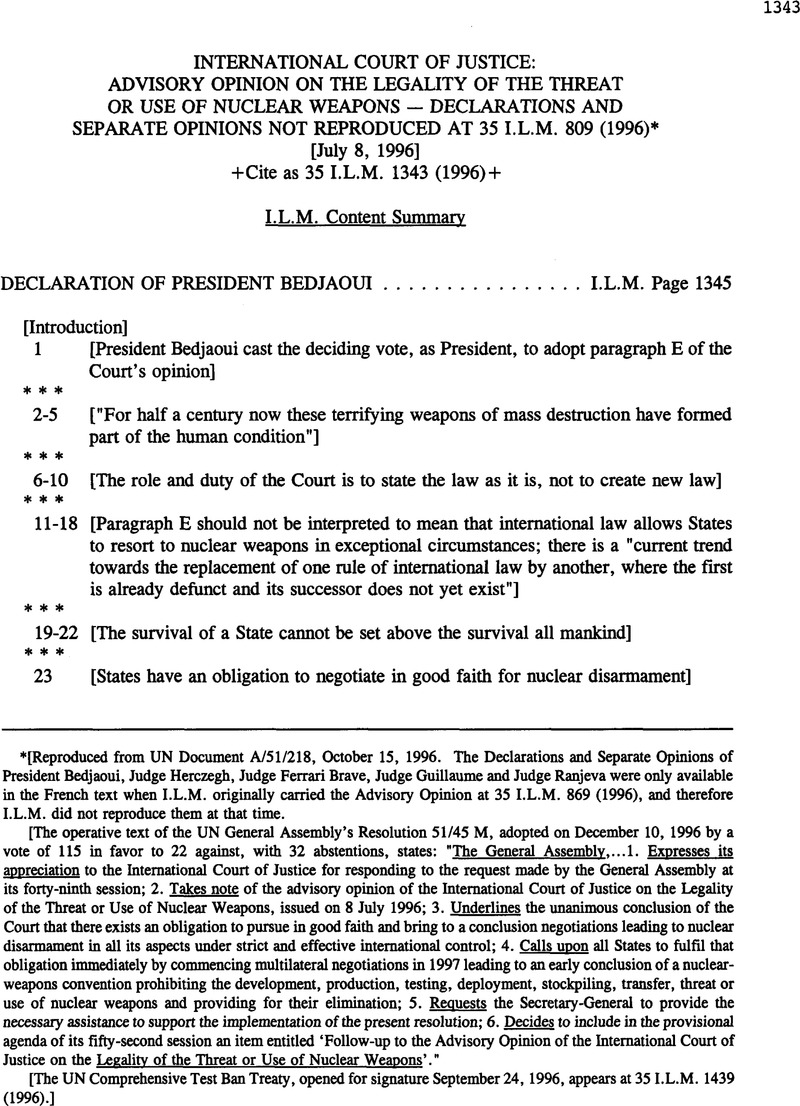Published online by Cambridge University Press: 18 May 2017

[Reproduced from UN Document A/51/218, October 15, 1996. The Declarations and Separate Opinions of President Bedjaoui, Judge Herczegh, Judge Ferrari Brave, Judge Guillaume and Judge Ranjeva were only available in the French text when I.L.M. originally carried the Advisory Opinion at 35 I.L.M. 869 (1996), and therefore I.L.M. did not reproduce them at that time.
5/ “ International law governs relations between independent states. The rules of law binding upon States therefore emanate from their own free will as expressed in conventions or by usages generally accepted as expressing principles of law and established in order to regulate the relations between these co-existing independent communities or with a view to the achievement of common aims”, Lotus case, judgment No. 9 of 7 September 1927, P.C.I.J., Series A, No. 10, p. 18.
6/ “The Court therefore must, in any event, ascertain whether or not there exists a rule of international law limiting the freedom of States to extend the criminal jurisdiction of their courts to a situation uniting the circumstances of the present case” (ibid., p. 21); and the Court concluded: “It must therefore be held that there is no principle of international law, within the meaning of Article 15 of the Convention of Lausanne of July 24, 1923, which precludes the institution of the criminal proceedings under consideration. Consequently, Turkey, by instituting, in virtue of the discretion which international law leaves to every sovereign State, the criminal proceedings in question, has not. In the absence of such principles, acted in a manner contrary to the principles of International law within the meaning of the special agreement” (ibid., p. 31).
7/ See paragraph 79 of the Advisory Opinion, which reads: “ It is undoubtedly because a great many rules of humanitarian law applicable in armed conflict are so fundamental to the respect of the human person and ‘elementary considerations of humanity’ as the Court put it in its Judgment of 9 April 1949 in the Corfu Channel case (I.C.J. Reports 1949, p. 22) that the Hague and Geneva Conventions have enjoyed a broad accession. Further these fundamental rules are to be observed by all States whether or not they have ratified the conventions that contain them, because they constitute intransgressible principles of international customary law.“
8/ Albert Einstein, How I See the World (tr. into French by Colonel Cros), Paris, Flamnarion, p. 84.
* [Reproduced from United States District Court for the District of Columbia, Order and Memorandum in Civil Case No. 94-2339 (JLG), filed July 31, 1996. Neither party has appealed the decision. The Introductory Note was prepared for International Legal Materials by Georges R. Delaume, Curtis, Mallet-Prevost, Colt & Mosle, and I.L.M. Corresponding Editor for International Arbitration. [The Foreign Sovereign Immunities Act, as amended in 1988, appears at 28 I.L.M. 396 (1989); the French Court of Cassation decision in Société Pabalk Ticaret Ltd. Sirketi v. Société Norsolor (holding the recognition of foreign awards is governed by French law because it is more favorable to recognition than the New York Convention) appears at 24 I.L.M. 360 (1985); the U.S. Supreme Court decision in Argentina V. Weltover, Inc. (standard for establishing jurisdiction over a foreign state in U.S. courts under the FSIA) appears at 31 I.L.M. 1220 (1992); the U.S. Supreme Court decision in Vimar Seguros Y Reaseguros, S.A. V. M/V Sky Reefer et al. (foreign arbitration clauses in maritime bills of lading) appears at 34 I.L.M. 1592 (1995); the U.S. Supreme Court decision in. Mitsubishi Motors Corp. v. Soler Chrysler Plymouth, Inc. (international arbitration) appears at 24 I.L.M. 1064 (1985); the U.S. Supreme Court decision in Scherck v. Alberto-Culver Co. (arbitration clauses) appears at 13 I.L.M. 974 (1974); the U.S. Court of Appeals for the District of Columbia Circuit decision in Laker Airways Ltd. v. Sabena, Belgian World Airlines (jurisdiction in antitrust action) appears at 23 I.L.M. 519 (1984); and the U.S. Supreme Court decision in W. S. Kirkpatrick & Co., Inc. v. Environmental Techtonics Corp., Int'l (act of state doctrine) appears at 29 I.L.M. 182 (1990).]
[The operative text of the UN General Assembly's Resolution 51/45 M, adopted on December 10, 1996 by a vote of 115 in favor to 22 against, with 32 abstentions, states: “The General Assembly,…1. Expresses its appreciation to the International Court of Justice for responding to the request made by the General Assembly at its forty-ninth session; 2. Takes note of the advisory opinion of the International Court of Justice on the Legality of the Threat or Use of Nuclear Weapons, issued on 8 July 1996; 3. Underlines the unanimous conclusion of the Court that there exists an obligation to pursue in good faith and bring to a conclusion negotiations leading to nuclear disarmament in all its aspects under strict and effective international control; 4. Calls upon all States to fulfil that obligation immediately by commencing multilateral negotiations in 1997 leading to an early conclusion of a nuclearweapons convention prohibiting the development, production, testing, deployment, stockpiling, transfer, threat or use of nuclear weapons and providing for their elimination; 5. Requests the Secretary-General to provide the necessary assistance to support the implementation of the present resolution; 6. Decides to include in the provisional agenda of its fifty-second session an item entitled ‘Follow-up to the Advisory Opinion of the International Court of Justice on the Legality of the Threat or Use of Nuclear Weapons’”.
[The UN Comprehensive Test Ban Treaty, opened for signature September 24,1996, appears at 35 I.L.M. 1439 (1996).]